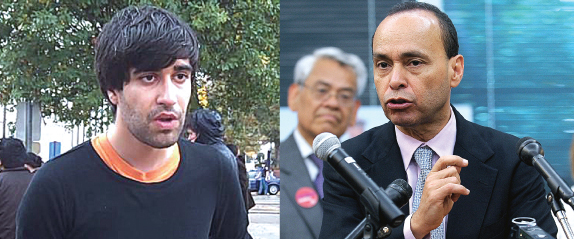
The dream unravels
Rift between DREAM supporters highlights gulf between institutional and grassroots advocacy
From opening salvo to latest installment, the recent skirmish between Rep. Luis Gutierrez and the grassroots organizations DREAMActivist.org and the National Immigrant Youth Alliance (NIYA) points to divergent strategies and fractures that run along generational and institutional lines.
It starts on Nov. 4 when the Illinois Representative and Democrat suddenly issues a statement that he is severing ties with the two organizations. In his official statment, Gutierrez links to a pdf containing what he considers racist (anti-white) remarks by NIYA's founder, Mohammad Abdollahi as well as some that allege to show Abdollahi's undercutting of comprehensive reform measures in order to bolster DREAMer-centered actions. The statement also points to an unauthorized recording of a meeting the Congressman had with the parents of the DREAM30 activists who have been detained after crossing the border from Mexico to the U.S.
NIYA and DREAMActivist responded with their own assertions that the recording was done by a DREAM30 parent, not the members of their organizations, and that Gutierrez's zeal in decrying both organizations publicly stems from the actual content of the recorded meeting. The grassroots organizations allege that Gutierrez attempted to put a wedge between NIYA with the DREAM30 parents by focusing on Abdollahi's homosexuality. What's more, they claim, Gutierrez hasn't been aligned with them for the past three years — the span of time in which their most visible and, arguably most effective, activist work has taken place.
Since the blow up, the sides have lined up neatly — and depressingly — along the fault lines of the immigration advocacy movement itself. On one side, the National Council of La Raza made clear its support of Gutierrez, as have organizations with authoritative voices, like Ali Noorani of the National Immigration Forum and the Illinois Coalition for Immigrant and Refugee Rights. Most major, mainstream media outlets have disseminated the congressman's version of the story, and noted anti-immigration bloggers like Susan Pai have latched on to it as well.
On the other side, young undocumented activists from the DREAM9 and those who have aligned with or identified as undocuqueer have pointed to what they say is a disturbing pattern in Gutierrez's behavior: talking for — instead of to — the DREAMers themselves, unresponsiveness, and purportedly sacrificing people for politics.
NIYA and DREAMActivist have lots of detractors. Their "in-your-face" style of activism rubs many the wrong way. But it's hard to deny how effective they've been. The DACA concessions drafted by President Obama shortly before his reelection in 2012 came on the heels of unrelenting NIYA-led occupations and sit-ins at Obama campaign offices across the nation demanding an executive order to grant DREAMers legalized status. Likewise, NIYA and DREAMActivist were the lead organizations rallying public support for the DREAM9 who crossed back from Mexico to the U.S. publicly earlier this year (members of the DREAM9 are affiliated with the two grassroots organizations), and now are doing the same with the DREAM30.
Some of the comments directed at NIYA and DREAMActivist in the wake of Gutierrez's announcement have to do with cautions about burning bridges with legislators "who can help." But such admonitions miss the essence of the two grassroots organizations: their activism seeks to speak directly to the American public, asking no one's permission or blessing.
Gutierrez is, without question, the legislator most closely associated with immigration reform at the moment. His national persona revolves around his willingness to keep talking about the issue, and his determination to craft a House solution even if it is piecemeal. He played a part — the most decisive part, some would argue — in the success of keeping the DREAM9 from deportation and seeing them released from detention. Gutierrez has "la palanca," as we say, to get things done where immigration needs are concerned.
But being part of the system has its costs, and the release of his statement has brought some of those to the fore. Gutierrez's claim of racism from NIYA on the basis of Abdollahi's comments about whites is a straw man. Even if Abdollahi's statements are accurately rendered, it makes no difference — reverse racism could only ever climb down from the realm of paranoid fantasy if our society's power structures routinely favored people of color and had done so for several centuries. No, power in our society still resides in resolutely white structures — like the House and the Senate — places to which Gutierrez has (some) access and to which Abdollahi —undocumented, Iranian, outspoken critic of the status quo — has none.
Gutierrez works within a sometimes intractable bureaucracy. He has every right to withhold and withdraw his support from those individuals and organizations he feels jeopardize his effectiveness and/or mission. But the truth is, he needs NIYA and DREAMActivist more than they need him. They're in the trenches, he's in the rarified corridors of Congress. They have young people at their back, he has a different generation at his. They're undocumented and their activism comes from their lived experiences, he is not and his advocacy, while empathetic, is second-hand.
Gutierrez doesn't have to like NIYA and DREAMActivist but he cannot afford to dismiss the challenges they point to. Because real change is never born within the structures of power of a society. It forces its way in loudly, noisily, uncomfortably and often in badly behaved, impolite ways from the outside.
From where NIYA and DREAMActivist live.









DEJE UN COMENTARIO: